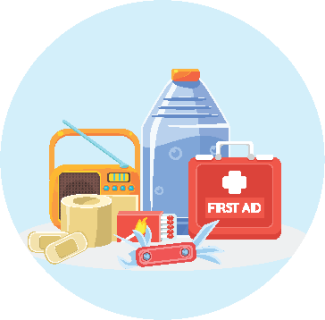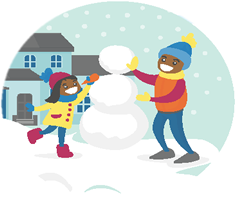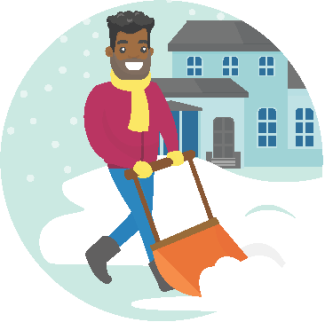Winter Health Tips
Staying safe and warm can be a challenge during the winter months. Learn how to prevent and identify cold-related illnesses, and how to stay safe and healthy during extreme cold and winter storms.
Stay Active in the Cold
Do not let cold weather stop you from exercising. You can stay fit and motivated while boosting your energy levels with these winter exercises.
- Warm up with stretching and light activities before your exercise routine.
- Layer up for warmth. Wear an inner layer that doesn’t absorb moisture, an insulation layer to retain heat, and an outer layer to protect you from wind, rain, and snow.
- Try activities like snowshoeing, cross country skiing, or ice skating.
- Explore the outdoors and enjoy your natural surroundings.
- Let your friends and family know where you will be before you go out.
Safe Snow Shoveling
Shoveling snow can be good exercise when performed correctly. Shoveling can also be harmful when someone tries to take on more than they can handle. Before you go outside to shovel:
- Talk to your doctor if you have a history of heart trouble to make sure it is safe for you to shovel snow.
- Drink plenty of water. (You can get dehydrated in cold weather too!)
- Dress warmly, and dress in several layers so you can remove a layer if needed.
- Avoid caffeine and nicotine as they can put extra strain on your heart.
- Warm up muscles in your arms and legs. Walk around for a few minutes and stretch your arms and legs. Warm muscles are less likely to get injured and work more efficiently.
Once you are outside shoveling:
- Take it slow! Pace yourself and take breaks.
- Don’t pick up too much snow at once. Use a smaller shovel, or only fill the shovel part way if you use a large shovel.
- Push the snow as you shovel—it is easier on your back.
- Protect your back. Bend from the knees and lift with your legs bent. Stand with your feet about hip width apart for good balance and keep the shovel close to your body.
- Try not to twist. If you need to move snow to one side, move your feet to face the direction you are throwing the snow.
- Listen to your body! Stop if you feel tired or feel tightness in your chest.
Extreme Cold
You can take steps to decrease the chance of illness or injury.
- The elderly is especially susceptible to extremely cold temperatures. Check on elderly friends, family, or neighbors frequently.
- Dress warmly, even if you are just making a short trip to the mailbox. If you fall or a door locks behind you, you could be exposed for a longer period of time than you planned.
- Dress warmly even when you are inside—especially if you do not move a lot.
- The temperature inside your home should be set according to your own activity level, health, and medications. What is an acceptable, fuel-saving temperature for an active family may not be safe for an older person who has difficulty moving or takes certain medications.
- Remove clothing if it gets damp or wet. Wet clothing can make you more prone to hypothermia.
- Do not drink alcohol. Alcohol lowers the body’s ability to retain heat.
- Check the Rhode Island Emergency Management Agency website to see if warming centers (places you can go indoors to stay warm) are open in your area.
Cold-related Illnesses: Frostbite, hypothermia, and carbon monoxide poisoning
- Frostbite is an injury to your body caused by freezing. The symptoms of frostbite are loss of feeling and loss of color, and it usually happens on the nose, ears, cheeks, chin, fingers or toes. Frostbite can cause permanent physical damage and in extreme cases, can lead to amputation. People with circulation problems or people who are not dressed properly for cold temperatures are more likely to suffer from frostbite. MORE
- When your body is exposed to cold temperatures, it begins to lose heat faster than it can make heat. Exposure to cold for long periods of time can cause abnormally low body temperatures, or hypothermia. Hypothermia causes the inability to think clearly or move easily. Symptoms of hypothermia in adults can include shivering, exhaustion, confusion, fumbling hands, memory loss, drowsiness, or slurred speech. In infants, symptoms of hypothermia can include bright red, cold skin and low energy. MORE
- Those at increased risk for hypothermia include:
- Anyone with thyroid or hormone system disorders;
- Anyone who has had a stroke or has a medical condition that causes paralysis and reduced awareness;
- Anyone with severe arthritis, Parkinson’s Disease, or other medical conditions that limit physical activity;
- Anyone with a medical condition that slows the normal flow of blood.
- Anyone with memory disorders;
- Anyone who takes medications to treat anxiety, depression, nausea or uses some over-the-counter cold remedies. MORE
- Carbon monoxide is invisible and odorless and it can cause loss of consciousness or death. The most common symptoms of CO poisoning are headache, dizziness, weakness, nausea, vomiting, chest pain and confusion. MORE
- To prevent carbon monoxide poisoning
- Never use a gas range or oven to heat your house.
- Do not use a charcoal grill, hibachi, lantern or portable camping stove inside your house.
- If you use a generator, make sure it is properly installed and vented.
- If you lose power and it is too cold inside your house, go to a friend or family’s home, a warming center, or a community shelter.

Before:
- If you think you’ll need extra help during an emergency, enroll in RISNER! MORE
- Make an emergency kit. MORE
- Practice your family’s Emergency Communications Plan
- Make sure you can heat at least one room in your home if power or furnace is not available.
- Know how to shut off water valves.
- Be aware of parking bans.
- Review the CDC’s tips for preparing your home and car for a winter storm. MORE
During:
- Know the signs and treatments for cold-related illnesses like hypothermia and frostbite. MORE
- Wear layers when going outside. Limit exposure of your skin to the cold.
- Avoid drinking alcohol as it can lower the body’s ability to keep warm.
- Call 911 in the event of an emergency.


After:
After:
- Check on older family, friends, and relatives. Older adults are especially susceptible to extreme temperatures.
- Be careful not to overexert yourself when shoveling snow. Stay hydrated.
- Do not run your vehicle until exhaust pipes have been cleared of snow.
- Review the CDC’s tips for how to stay safe during and after a winter storm. MORE
